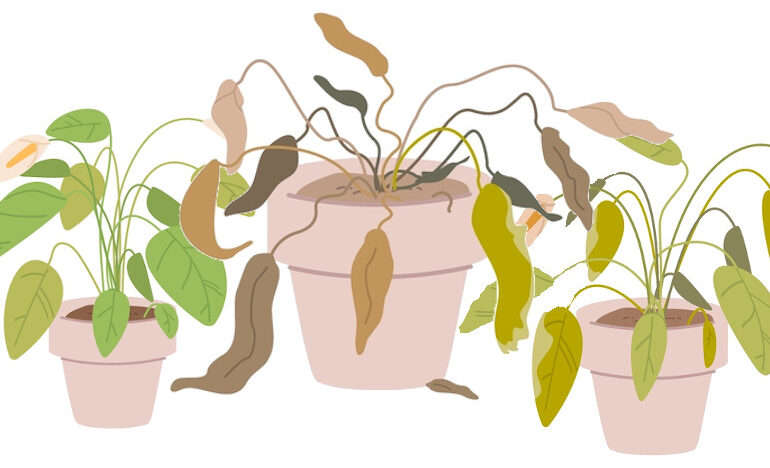The Necessities for Life

An Assembling God’s Puzzle video
By Fr. Garry Richmeier
We have a good number of plants scattered around our house, and I’m basically the one who takes care of them. They do pretty well generally, but once in awhile a plant will start showing signs that all is not well – the leaves start turning brown, the stems start drooping, or the leaves start falling off.
When that happens, I start wondering what is wrong with the plant. I don’t do this in the sense of blaming the plant, as if it is being difficult, or doesn’t like me, or that it has a crazy death wish. I know that the symptoms are not really about the plant, but about what the plant is being given in order to grow. The needs of plants are pretty simple. They need the right temperature, and the right amount of water, nutrients, and sunshine. If all this is provided, they naturally thrive. So if one of my plants is not thriving, I try to figure out what necessities I’m not providing enough of, or what I’m providing too much of.
This is pretty much how it works with anything that is living. Everything is designed to grow if given the right stuff. It is pretty automatic.
It works this way with human beings also, although we sometimes forget this and we attribute “failure to thrive” to some other reason. When humans are not growing well, the symptoms are not leaves falling off. The symptoms are things like depression, violence, acting out, rigid/simplistic thinking, mistrust of the unfamiliar, dishonesty, criminal behavior, crippling fear, anxiety, and so on.
When someone exhibits any of these behaviors, our society tends to treat them as if there is something wrong with the person, and efforts to “fix” them are made. So the medical profession addresses the disease causing the symptoms. The legal system addresses the violation of the law. The mental health system diagnoses and addresses the mental illness. Religion addresses the sinful act.
At their best, these are all ways of trying to help the person who is not thriving or growing well. But they tend not to be too helpful in the long run because they often don’t address where the “illness” came from in the first place – the lack of the necessary elements for natural growth and health. And until this issue is addressed, the person isn’t likely to get better.
The connection between the “illness” and the lack of necessary elements needed for health is often pretty obvious. A child who grows up with constant criticism (lacking encouragement) will often have a problematic attitude regarding achievement. A woman in a long-term physically abusive relationship (lacking safety) will often find trusting others difficult. A child who was neglected or abandoned (lacking early emotional attachment) will find it difficult to create and maintain healthy relationships.
And yet, this evidence is often ignored as we go about addressing symptoms. This points to two different views we can have of us humans, and which view we choose will determine how we treat each other.
- The first view is that there is something basically wrong with the human person, and we need to correct or fix what is wrong, often using force, fear, chemicals, restraint, threat, or some other outside influence, often without the consent of the one who is “ill.”
- The second view holds that supplying the person with the necessary elements for health and growth, like giving a plant what it needs, will naturally result in positive outcomes and the increase of life.
I believe the best way to help an ailing person, as well as an ailing plant, is to supply what is needed for the natural process of growth. This is relatively simple with a plant, but what humans need in order to thrive is much more complicated, and requires much more time and effort just to understand what is has been lacking and what is needed now. Maybe that is why we tend to focus on the simpler problem of eradicating the symptoms rather than providing resources necessary for health.
My experience as a counselor has convinced me that people will heal and grow if they get the necessities they need. As a counselor, I do not have answers to “fix” people. What I do is offer some elements that every human being needs in order to survive and thrive. This includes helping people know that they are important by listening to them respectfully.
I let them know that their problems and difficulties are important by not trivializing their experience, or trying to convince them to feel otherwise. I make sure they know they are not weird or crazy by assuring them that many others have had the same experiences.
And I express trust and confidence in their abilities to discern how to go about addressing their problems and make their life better. Instead of addressing client’s symptoms, I offer validation, respect, acceptance, care, and confidence in their abilities. I often find those are the life-giving ingredients that they may have been missing but need to deal with their problems, and grow and thrive.
Jesus said “I am the way, the truth, and the life.” In other words, he said if we do what he did, we will find life (grow and thrive) for ourselves and others. What did he do? He offered everyone he met the nutrients they needed to grow – respect, care, compassion, forgiveness, acceptance, love, and the assurance of being God’s beloved children. If we do the same, we will “grow” many more healthy and whole human beings.
All of the videos in this series can be found here: Assembly God’s Puzzle.
Never miss an article published on the Renewal Center website: Sign up to receive our newsletters.
[Fr. Garry Richmeier, a Precious Blood priest and spiritual director, holds a Master’s of Divinity Degree from St John’s University in Collegeville, Minnesota, and a Master’s of Counseling Psychology degree from the University of Missouri-Kansas City. He is a licensed professional counselor and a licensed marriage and family therapist.]
ID 258550723 © Ssstocker | Dreamstime.com — The Necessities for Life — An Assembling God’s Puzzle video
We’d Like to Hear from You!
We’d like to know what you think about this article. Send us a comment using the form below. Do you have a suggestion? Is there something you want to learn more about? Send us a note.
Related

Making a Banner for Lent Part 2
A Coffee with Padre Video
Fr. Timothy finishes his Lenten banner and continues his reflections on how colors and materials become potent symbols that bring the Lenten season alive. The final banner serves as a visual reminder of our spiritual journeys.

Lent Video Four — Guided Meditation: ‘Traveling in the Dust of the Rabbi’
In this video, Fr. Ron reads the Gospel, Mark 1:29-34, for you and then leads you through a guided meditation, taking you deeper into that story. He calls this experience “an example of traveling in the dust of the rabbi.”
Categories
Assembling God's Puzzle Coffee with Padre Cooking & Spirituality Encounters of the 4th Kind Family Matters Reflections on the Eucharsitic Prayers Spiritual Resources Taize Prayers The Contemplative Life Traveling with Pilgrims of Hope Uncategorized Videos Week of Prayer for Uhristian Unity When you need a little help
